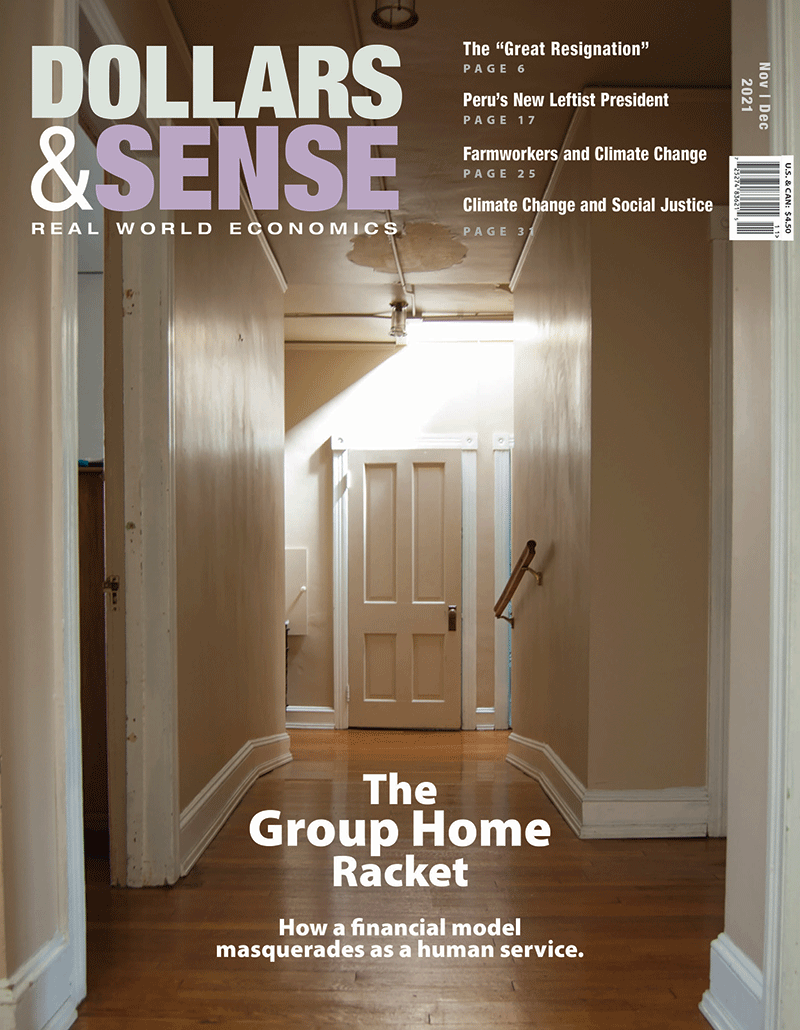Fighting Climate Change in Portlandia
Not only is failure not an option, those fighting to avert cataclysmic climate change have achieved important successes worthy of celebrating.

Our November/December 2021 issue is being printed, and e-subscribers have received their digital copies! (Not a subscriber? Subscribe now, here!)
You can find the table of contents of the new issue here, and here is the p. 2 editors' note:
What’s happening to group homes is happening across the economy: Workers are quitting on a mass scale—a record 2.9% of the workforce, or 4.3 million resignations, in August alone, according to the Bureau of Labor Statistics. Sonali Kolhatkar’s article in this issue helps explain the phenomenon, which has been dubbed the “Great Resignation.” Kolhatkar cites a Harris poll of currently employed workers, half of whom said they intend to make a career change because of the Covid-19 pandemic. The poll, which was commissioned by Catalyst (a nonprofit focused on women and the workplace) and CNBC, found that 76% of respondents said they “want their company to make work permanently flexible in terms of things like schedule and/or location.” Kolhatkar relates the mass exodus from the labor market to the recent uptick in strikes, with more than 100,000 workers across a range of industries currently striking or threatening to strike. Kolhatkar writes that “taken together with mass resignations, such worker strikes reveal a deep dissatisfaction with the nature of American work that has been decades in the making.”
So why now? The answer is surely related to the pandemic and its effects on working conditions and labor relations, and the opportunity to think about where you work afforded by federal government relief, no matter how meager and temporary. Women appear to be at the forefront of the Great Resignation, and childcare issues—the lack of availability of affordable daycare, and the dangers posed to kids by the pandemic—is another factor driving people to quit. And older workers, concerned about Covid-19 risks in the workplace (and flush with increasing asset values in homes and stocks), are retiring at a faster clip, according to Fed economist Miguel Faria e Castro.
One factor that does not appear to be contributing much to resignations, retirements, and strikes is vaccine mandates. A poll commissioned by The Conversation showed that very few people have quit their jobs in response to mandates. And as Jeff Schuhrke pointed out in In These Times, some media observers claiming that labor unions are opposed to vaccine mandates are confusing collective bargaining demands about how vaccine mandates are implemented with opposition to mandates altogether. Two-fifths of respondants in the Catalyst/CNBC Harris poll said they considered quitting because their boss “has not cared about their concerns during the pandemic,” and a recent Gallup poll showed a sizeable majority of Americans favor workplace vaccine mandates.
Also in this issue: Peru’s new president, how climate change is affecting farmworkers, a review of a book on why you hate your job, why we must address social justice and climate change at the same time, and more!